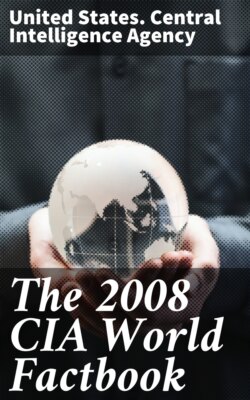Читать книгу The 2008 CIA World Factbook - United States. Central Intelligence Agency - Страница 321
На сайте Литреса книга снята с продажи.
NA
ОглавлениеTelevisions:
1,000 (1997)
Internet country code:
.km
Internet hosts:
8 (2008)
Internet Service Providers (ISPs):
1 (2000)
Internet users:
21,000 (2006)
Transportation
Comoros
Airports:
4 (2007)
Airports - with paved runways:
total: 4 2,438 to 3,047 m: 1 914 to 1,523 m: 3 (2007)
Roadways:
total: 880 km paved: 673 km unpaved: 207 km (2002)
Merchant marine:
total: 136 by type: bulk carrier 15, cargo 87, carrier 2, chemical tanker 5, container 2, passenger 1, passenger/cargo 1, petroleum tanker 9, refrigerated cargo 5, roll on/roll off 8, specialized tanker 1 foreign-owned: 68 (Bangladesh 2, Bulgaria 2, Cyprus 1, Greece 6, India 2, Kenya 1, Kuwait 1, Lebanon 4, Norway 1, Pakistan 4, Philippines 1, Russia 12, Saudi Arabia 1, Singapore 1, Syria 4, Turkey 8, Ukraine 8, UAE 7, US 2) (2008)
Ports and terminals:
Mayotte, Mutsamudu
Military
Comoros
Military branches:
National Development Army (AND): Comoran Security Force; Comoran
Federal Police (2008)
Manpower available for military service:
males age 16–49: 167,850 females age 16–49: 167,362 (2008 est.)
Manpower fit for military service:
males age 16–49: 121,550 females age 16–49: 131,015 (2008 est.)
Manpower reaching militarily significant age annually:
male: 7,901 female: 7,894 (2008 est.)
Military expenditures:
2.8% of GDP (2006)
Transnational Issues
Comoros
Disputes - international:
claims French-administered Mayotte and challenges France's and Madagascar's claims to Banc du Geyser, a drying reef in the Mozambique Channel; in May 2008, African Union forces are called in to assist the Comoros military recapture Anjouan Island from rebels who seized it in 2001
This page was last updated on 18 December, 2008
======================================================================
@Congo, Democratic Republic of the
Introduction
Congo, Democratic Republic of the
Background:
Established as a Belgian colony in 1908, the Republic of the Congo gained its independence in 1960, but its early years were marred by political and social instability. Col. Joseph MOBUTU seized power and declared himself president in a November 1965 coup. He subsequently changed his name - to MOBUTU Sese Seko - as well as that of the country - to Zaire. MOBUTU retained his position for 32 years through several sham elections, as well as through the use of brutal force. Ethnic strife and civil war, touched off by a massive inflow of refugees in 1994 from fighting in Rwanda and Burundi, led in May 1997 to the toppling of the MOBUTU regime by a rebellion backed by Rwanda and Uganda and fronted by Laurent KABILA. He renamed the country the Democratic Republic of the Congo (DRC), but in August 1998 his regime was itself challenged by a second insurrection again backed by Rwanda and Uganda. Troops from Angola, Chad, Namibia, Sudan, and Zimbabwe intervened to support KABILA's regime. A cease-fire was signed in July 1999 by the DRC, Congolese armed rebel groups, Angola, Namibia, Rwanda, Uganda, and Zimbabwe but sporadic fighting continued. Laurent KABILA was assassinated in January 2001 and his son, Joseph KABILA, was named head of state. In October 2002, the new president was successful in negotiating the withdrawal of Rwandan forces occupying eastern Congo; two months later, the Pretoria Accord was signed by all remaining warring parties to end the fighting and establish a government of national unity. A transitional government was set up in July 2003. Joseph KABILA as president and four vice presidents represented the former government, former rebel groups, the political opposition, and civil society. The transitional government held a successful constitutional referendum in December 2005 and elections for the presidency, National Assembly, and provincial legislatures in 2006. KABILA was inaugurated president in December 2006. The National Assembly was installed in September 2006. Its president, Vital KAMERHE, was chosen in December. Provincial assemblies were constituted in early 2007, and elected governors and national senators in January 2007.
Geography
Congo, Democratic Republic of the
Location:
Central Africa, northeast of Angola
Geographic coordinates:
